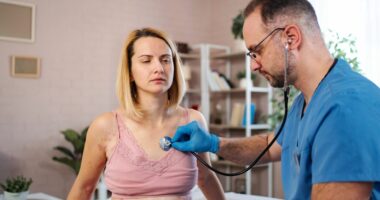Share this @internewscast.com
Many of our jobs require us to look at a computer screen for hours on end, which isn’t necessarily good for us. Keeping your screen at eye level to avoid hunching over, placing your feet flat on the floor and taking regular breaks can help prevent your body from feeling too stiff or rigid after sitting in front of a screen for prolonged periods.
But it’s not just our bodies that might be suffering from the screen, it’s likely our computers are also doing some damage to our skin. If you work from home, it might be tempting to skip skincare, especially SPF if you’re not planning to go outside. While getting ready for the day and taking a few moments to ensure our skin is prepped is important for our general mood and wellbeing, it could also be crucial to preventing damage that comes from staring at a screen, and SPF is an essential step here. Not only does it protect against premature ageing caused by UV rays, it can also protect our faces from the damage that comes from our screens.
Speaking to the Guardian, skin expert and laser and aesthetic medicine specialist at the HVN, Dr Tanja Phillips shared that she wears an SPF while using a computer and stressed the importance of doing so.
“Even inside without any windows, if I am using a computer screen, I will wear an SPF,” said the expert. It’s important to wear SPF inside, and even on cloudy days, as harmful UVA rays can still penetrate windows and damage skin.
But Dr Phillips shared that she takes extra care to wear SPF “to protect from HEV rays” when working on a computer. Also known as blue light, HEV rays stands for high-energy visible light.
Although the sun emits most of the HEV light that we are exposed to, it can also be found in devices like computers and can contribute to overall skin damage.
The high energy levels found in blue light can penetrate deep into the skin, reducing elasticity and leading to an imbalance in melanin production, affecting the overall health of our skin.
If you’re often looking at a computer screen, it’s important to protect the skin from damage caused by blue light. SPF can help, but not all sunscreens offer complete coverage and protection against it.
Instead, Dr Phillips recommended choosing an SPF that specifically protects against UVA, UVB and HEV rays, with products containing ingredients like niacinamide, gossypium herbaceum and iron oxide offering a stronger defense against blue light.













